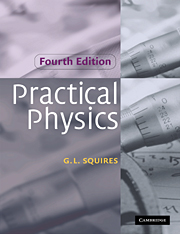Book contents
- Frontmatter
- Contents
- Preface to the fourth edition
- Preface to the first edition
- 1 The object of practical physics
- PART 1 STATISTICAL TREATMENT OF DATA
- PART 2 EXPERIMENTAL METHODS
- PART 3 RECORD AND CALCULATIONS
- 10 Record of the experiment
- 11 Graphs
- 12 Arithmetic
- 13 Writing a paper
- APPENDICES
- Solutions to exercises
- Some useful books
- References
- Index
12 - Arithmetic
Published online by Cambridge University Press: 05 June 2012
- Frontmatter
- Contents
- Preface to the fourth edition
- Preface to the first edition
- 1 The object of practical physics
- PART 1 STATISTICAL TREATMENT OF DATA
- PART 2 EXPERIMENTAL METHODS
- PART 3 RECORD AND CALCULATIONS
- 10 Record of the experiment
- 11 Graphs
- 12 Arithmetic
- 13 Writing a paper
- APPENDICES
- Solutions to exercises
- Some useful books
- References
- Index
Summary
Arithmetic is important
The object of an experiment is to obtain a number, and the correct working out of that number is just as important as the taking of the measurements. Many experiments performed by students, containing sensible measurements, are ruined by mistakes in calculating the results.
The following devices are available for calculations:
computer,
calculator,
you.
They are listed in order of decreasing expense and increasing availability. Choose the one appropriate to the job.
Computers
There are experiments where large computers are necessary, for example in the processing of radio and optical images studied in astrophysics, or in the determination of complicated biological structures by the analysis of X-ray diffraction patterns. However, for the type of experiment we are concerned with, the small computers available in the laboratory and in many homes are entirely adequate.
The great majority of the calculations that require a computer are best done with a spreadsheet. A spreadsheet such as Excel® is extremely versatile; it has a large range of functions – arithmetical, trigonometric, statistical, and logical – and a variety of features for controlling the appearance of the output, which includes the number of digits shown for a number. You can put comments and labels throughout the output, and you are strongly advised to do this liberally, so that when you look at it at a later date you will follow what has been done.
- Type
- Chapter
- Information
- Practical Physics , pp. 144 - 151Publisher: Cambridge University PressPrint publication year: 2001



